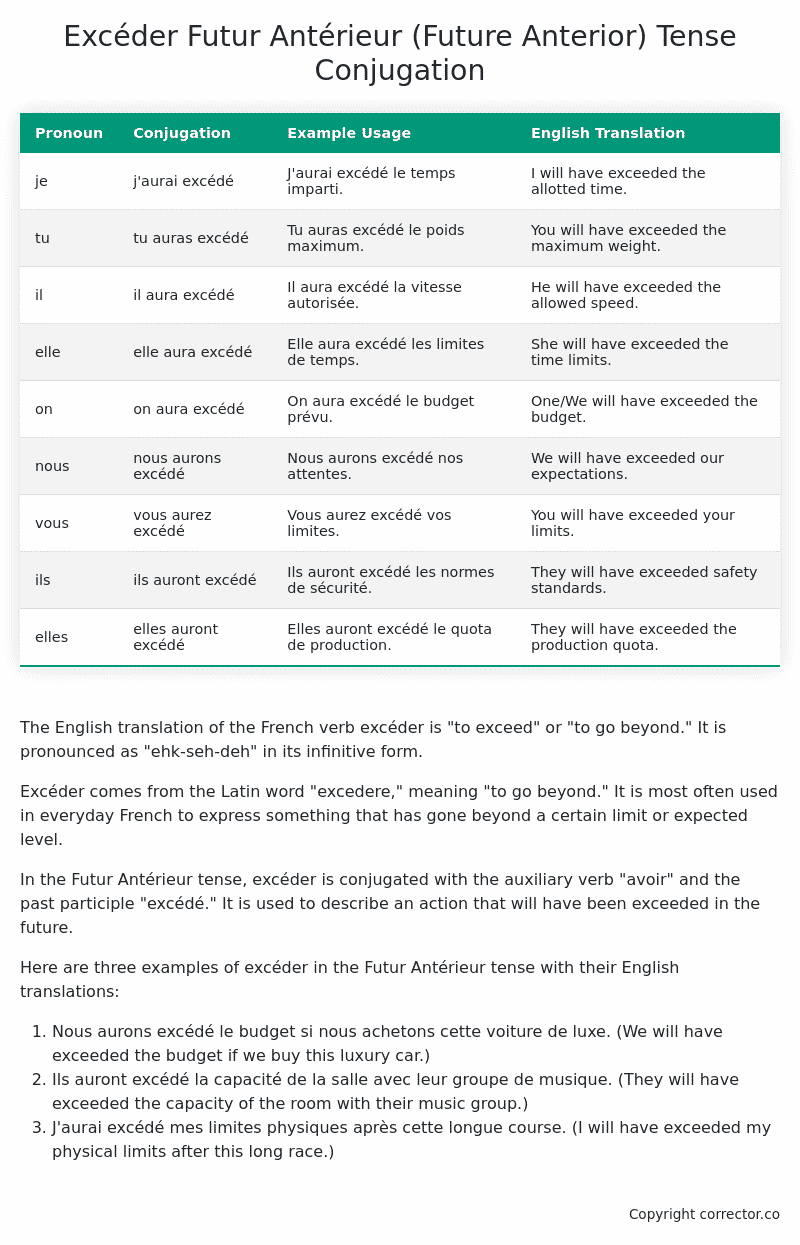Futur Antérieur (Future Anterior) Tense Conjugation of the French Verb excéder
Introduction to the verb excéder
The English translation of the French verb excéder is “to exceed” or “to go beyond.” It is pronounced as “ehk-seh-deh” in its infinitive form.
Excéder comes from the Latin word “excedere,” meaning “to go beyond.” It is most often used in everyday French to express something that has gone beyond a certain limit or expected level.
In the Futur Antérieur tense, excéder is conjugated with the auxiliary verb “avoir” and the past participle “excédé.” It is used to describe an action that will have been exceeded in the future.
Here are three examples of excéder in the Futur Antérieur tense with their English translations:
- Nous aurons excédé le budget si nous achetons cette voiture de luxe. (We will have exceeded the budget if we buy this luxury car.)
- Ils auront excédé la capacité de la salle avec leur groupe de musique. (They will have exceeded the capacity of the room with their music group.)
- J’aurai excédé mes limites physiques après cette longue course. (I will have exceeded my physical limits after this long race.)
Table of the Futur Antérieur (Future Anterior) Tense Conjugation of excéder
| Pronoun | Conjugation | Example Usage | English Translation |
|---|---|---|---|
| je | j’aurai excédé | J’aurai excédé le temps imparti. | I will have exceeded the allotted time. |
| tu | tu auras excédé | Tu auras excédé le poids maximum. | You will have exceeded the maximum weight. |
| il | il aura excédé | Il aura excédé la vitesse autorisée. | He will have exceeded the allowed speed. |
| elle | elle aura excédé | Elle aura excédé les limites de temps. | She will have exceeded the time limits. |
| on | on aura excédé | On aura excédé le budget prévu. | One/We will have exceeded the budget. |
| nous | nous aurons excédé | Nous aurons excédé nos attentes. | We will have exceeded our expectations. |
| vous | vous aurez excédé | Vous aurez excédé vos limites. | You will have exceeded your limits. |
| ils | ils auront excédé | Ils auront excédé les normes de sécurité. | They will have exceeded safety standards. |
| elles | elles auront excédé | Elles auront excédé le quota de production. | They will have exceeded the production quota. |
Other Conjugations for Excéder.
Le Present (Present Tense) Conjugation of the French Verb excéder
Imparfait (Imperfect) Tense Conjugation of the French Verb excéder
Passé Simple (Simple Past) Tense Conjugation of the French Verb excéder
Passé Composé (Present Perfect) Tense Conjugation of the French Verb excéder
Futur Simple (Simple Future) Tense Conjugation of the French Verb excéder
Futur Proche (Near Future) Tense Conjugation of the French Verb excéder
Plus-que-parfait (Pluperfect) Tense Conjugation of the French Verb excéder
Passé Antérieur (Past Anterior) Tense Conjugation of the French Verb excéder
Futur Antérieur (Future Anterior) Tense Conjugation of the French Verb excéder (this article)
Subjonctif Présent (Subjunctive Present) Tense Conjugation of the French Verb excéder
Subjonctif Passé (Subjunctive Past) Tense Conjugation of the French Verb excéder
Subjonctif Imparfait (Subjunctive Imperfect) Tense Conjugation of the French Verb excéder
Subjonctif Plus-que-parfait (Subjunctive Pluperfect) Tense Conjugation of the French Verb excéder
Conditionnel Présent (Conditional Present) Tense Conjugation of the French Verb excéder
Conditionnel Passé (Conditional Past) Tense Conjugation of the French Verb excéder
L’impératif Présent (Imperative Present) Tense Conjugation of the French Verb excéder
L’infinitif Présent (Infinitive Present) Tense Conjugation of the French Verb excéder
Struggling with French verbs or the language in general? Why not use our free French Grammar Checker – no registration required!
Get a FREE Download Study Sheet of this Conjugation 🔥
Simply right click the image below, click “save image” and get your free reference for the excéder Futur Antérieur tense conjugation!

Excéder – About the French Futur Antérieur (Future Anterior) Tense
Construction
Common Everyday Usage Patterns
Interactions with Other Tenses
For example
Summary
I hope you enjoyed this article on the verb excéder. Still in a learning mood? Check out another TOTALLY random French verb conjugation!


